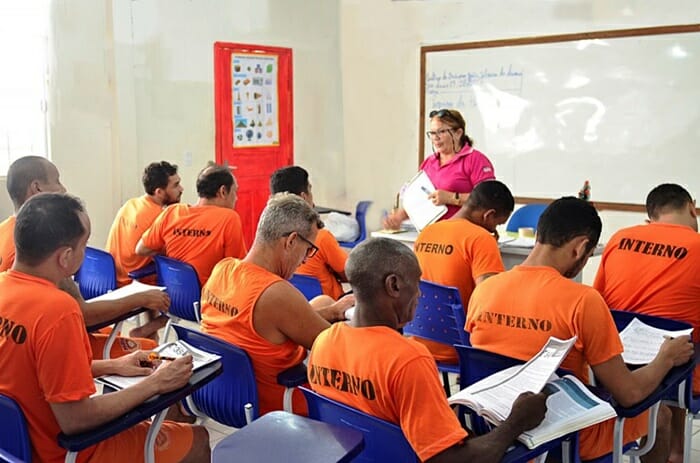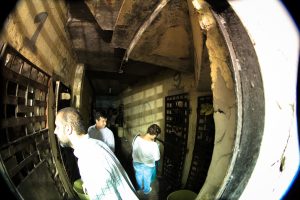How to alleviate the crisis in the brazilian prison system
Measures focusing on education, as seen in the Pedrinhas prison, show that it is possible to this reduce the number of re-offenders, by providing the right conditions for prisoners returning to society.
 In 2018, 431 detainees at the Complex passed Enem PPL, the university entrance exam for people deprived of liberty and for young people in correction centres. The pass rate was over 50%.
In 2018, 431 detainees at the Complex passed Enem PPL, the university entrance exam for people deprived of liberty and for young people in correction centres. The pass rate was over 50%.
The very same place where prisoners were beheaded also set a new record for the number of candidates to pass the Brazilian public university entrance exam, for people deprived of liberty (Enem para Pessoas Privadas de Liberdade – PPL), in 2018. At the institution formerly known as Pedrinhas Penitentiary Complex and now called the São Luís Penitentiary Complex, 69 out of the 120 people who took the exam passed. Greater attention to education and prizes for writing competitions were some of the measures adopted to diminish problems at the complex, that had become a symbol of violence in the penitentiary system.
Research by the Brazilian Forum for National Security showed that 57% of the population support the statement “bandido bom é bandido morto” (a good villain is a dead one). Against this backdrop methods for re-socialisation smack of privilege. It is not surprising that a study carried out by the Instituto de Pesquisa Econômica Aplicada (Ipea), in 2015, showed that one in four ex-convicts re-offend within five years, a rate of 24.4%. Measures focusing on education, as seen in Pedrinhas, show it is possible to reduce this rate, by providing the right conditions for prisoners returning to society.
According to Monitor da Violência — a partnership between G1, Núcleo de Estudos da Violência (NEV) at the University of Sao Paulo (USP) and the Brazilian Forum for Public Security — there are 92,945 prisoners currently studying in Brazil, as well as 139,511 doing some kind of work. The total number of people deprived of liberty is 737,892.
Read more
In Piauí, the state with the highest percentage of prisoners studying (40%), the change took place through a partnership with the Secretary of Education who record classes, hold teleconference sessions and also offer a reading programme. This all helps in reducing sentences. In Sergipe, which has the highest number of people in work (37.2%), there was an improvement in the system with the creation of an independent group focused on re-entry into society.
But governments do not always focus on these kinds of measures. In these cases, the work of inspection and monitoring falls to NGOs who fill the gaps left by public authorities.
“Dialogue between civil society and the Brazilian state is essential in achieving a positive outcome.” Said Conectas Lawyer, Henrique Apolinário, who is a member of the CNPCT (the National Committee for the Prevention and Combat of Torture). “Families of prisoners and people who have been in prison, are organising themselves into groups of common interest in their states, but are still marginalised.”
A way out of the chaos
Wearing just his underpants, one prisoner smears mud on another man. “I don’t like being touched either, but sometimes it’s what you need to stop being so shy. It’ll be good, you’re going to have a different experience.” Says one of the prisoners participating in the documentary series “Inside the World’s Toughest Prisons” on Netflix. “In this moment, there aren’t any factions here, right now everyone is equal, nobody is better than anyone else.” He says, before joining some other men for a circle dance accompanied by the sound of drums. The activity ends with a collective wash around a large water tank where the prisoners appear to clean not only their bodies, but also their minds.
The ritual with mud is one of the alternative therapies provided by the NGO Acuda for prisoners at the State Penitentiary Ênio dos Santos Pinheiro, in Porto Velho (Roraima). As well as this activity, Acuda offers meditation techniques, reiki and even ceremonies with ayahuasca tea. Despite its unconventionality, the NGOs idea for methods of re-socialisation is to change behaviour by touching on something deeper in the inmates – their mentality.
This is also the idea of the Art of Living programme, Prison SMART that uses breathing techniques to alleviate stress and trauma, helping prisoners’ emotional balance.
“If people get sick, we take them to the hospital and give them the right medicine to get better. If people’s behaviour is sick, we bring them to prison, but we forget the medicine.” Says the founder, Sri Ravi Shankar, on the institution’s site.
NGOs like Conectas and ITTC (Institute for Land, Labour and Citizenship) work on monitoring and promoting basic human rights. While ITCC rejects the notion of imprisonment, in addition to monitoring, they are dedicated to providing information manuals that circulate inside prison units.

“It is essential that these people tell their stories to society and contribute to the construction of effective public policies. Likewise, the struggle for disincarceration is ongoing and varied in each region of the country and requires local strategies.” Lawyer Henrique Apolinário believes.
The real option for overcrowding in prisons and consequently an improvement in prisoner’s re-entry to society is alternative sentencing. This year, the National Board of Justice (CNJ) set rules for reducing incarceration in the country, with guidelines that judges must follow when giving alternative prison sentences, such as fines, community service and courses.
“Most people in prison are being held for property crimes and non-violent crimes. These people could be held accountable in a more efficient and less costly way.” Said Minister Dias Toffoli, President of the CNJ. In 2015, according to a study by the CNJ only three out of ten convicts were given alternative sentences. The Minister sees the new guidelines as a “way out of the chaos”.
Help Conectas to monitor and promote basic human rights in Brazilian prisons. Go to our page and make a donation.






